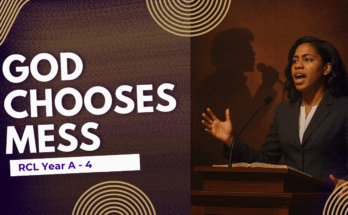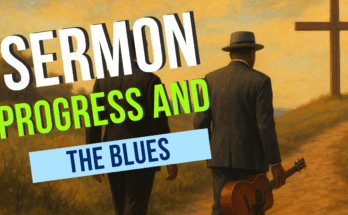As an Amazon Associate I earn from qualifying purchases.
Closing The Sermon With Power
Chapter 2: The Key to the Close
So what is the key to having a solid ending? I think it is one simple word, Celebration. Let me say that again, “Celebration is the key to closing your sermon with power. Now in later chapters, I will write about how to do that, but if there is only one thing you get from the book, it is you need to celebrate the gospel message that you presented in your sermon to have a powerful close.
What is celebration? Here is one definition of celebration within the context of preaching,
Celebration is holding up the intellectual truth of the message for a response from the emotional and spiritual dimensions of humanity.
Look closely at that statement. First you must have presented “intellectual truth” to have celebration. People are not celebrating or yelling about nothing. No, they are celebrating the truth.
 Another point is that the celebration is related to the truth OF the message. In other words it is truth that you presented in the message. I am not talking about you bringing in something to shout about at the end of the message that is not related to the message at all.
Another point is that the celebration is related to the truth OF the message. In other words it is truth that you presented in the message. I am not talking about you bringing in something to shout about at the end of the message that is not related to the message at all.
To be blunt, I am not talking about shouting “EEEAAARRRLLLYYY Sunday morning” at the end of a sermon just to get a shout when it isn’t related to the truth of the message.
Finally, look at that statement again, it says that the truth connects with the emotion and the spirit. That is your celebration. Note the Intellectual, Spiritual, and emotional components of humanity are involved when celebration is genuine.
To repeat, in the celebration, you are seeking to deal with the intellect, spiritual, and the emotive dimensions of humanity. In addition, you are seeking to create an experience with the truth of the message.
How To Improve Sermons
I’ve gotten emails where individuals have asked questions like these:
“What can I do to improve my sermons?”
“What can I do to make my sermons more interesting?”
“What can I do to make people understand my message better?”
The one thing that I usually emphasize in answering many of these emails is the one thing that can improve many sermons. One thing that can improve both the reception and the understanding of your messages is to have a celebration.
Is Celebration Application?
One preacher asked me, “Is celebration the application?” I had to contemplate the question. The preacher knew that we are told that we need to “apply” the truth in our messages. And then here I come talking about we need to “celebrate” the truth in our messages.
I told the preacher I needed to get back with him on that. I then began contemplating the question. Application is making sure that the people understand the truth of the message by applying it to the real life circumstances of the people.
Celebration is the experience that happens when we totally understand the truth of the message. Therefore Application is important and necessary for the understanding and experiencing of the truth, but celebration is what happens after the understanding has hit home.
So they are two different things, but related deeply and dependent on one another.
Is Celebration Our Work or God’s Work?
Yes…
What?
Forgive me, that is a trick question. Just like you don’t ask if Jesus was God or human. You don’t ask if the sermon is a product of God or human beings. It is an example of God working through us. It is an example of God using us to tell God’s story. In the sermon, human beings are the author, but so is God.
As it is in the sermon, so it is in the celebration. It is God’s work, but it is our work. Because it is our work, we must plan the celebration knowing that if we are faithful, God is with us.
Possible Problems When We Force Celebration
What are some problems when you teach addressing the emotive dimensions of humanity? Emotionalism
This happens when we disconnect the emotional response from the intellect. If the people don’t understand why they are shouting, then the intellect is not involved. Then we have a counterfeit celebration.
Again, note that true celebration is not separating the emotion from the intellect. It is not something that you do at the end of your sermons to salvage them. It does not make up for lack of preparation.
Too many times, we can find ourselves in the position of going to flunksville and then trying to use emotionalism to get us over the hump. But no, celebration is the emotional response to intellectual truth. It is the experience from the intellect. In fact, true celebration cannot exist unless you truly understand the message that’s presented.
The way celebration works is, during the sermon you present the truth; during the celebrative close, you
emotionally experience the truth of what you have presented.
If you haven’t dealt with the intellect in the sermon, then what you are doing is not going to help anybody and it’s not going to provide a solid foundation for the people in their daily lives. In fact, you are doing a disservice to your people if you do not deal with the intellect before you attempt to celebrate anything or before you attempt to engage the emotions.
What I’m talking about right now is what Martha Simmons referred to as the “Dark Side of Whooping.” There are some individuals who use whooping and/or celebrative closes as a tool to overcome a weak presentation.
They get to the end of the sermon and just start whooping. The people may shout, they may yell. You may wreck the house, but if the people don’t understand the intellectual truth of what you have presented, then it is just “sounding brass or tinkling cymbal.”
Another problem is when an individual spends too much time worrying about style and not enough time worrying about substance.
Now I must hasten to add that I am not saying that celebration is only style. Someone said that “Good meat makes its own gravy.” Likewise I would say, “Good intellectual truth makes its own celebration.” If you are trying to make gravy without any meat, then it is not a gravy problem, it is a meat problem. If you are trying to celebrate without any intellectual truth, it is not a celebration problem it is a intellectual truth problem. And to be honest, it is a preacher problem.
Generally we find preachers who fall into one of two traps when dealing with style. Some of us think style doesn’t
have anything to do with anything and we shouldn’t spend any time worrying about such concerns. And then there are the other folks who spend the vast majority of their time only thinking about style. And both of these sides are
problematic because, we must have both the intellect and the emotive addressed in our sermons. We need them both together. I would also say that the style and substance go together just as meat goes with the gravy.
Conclusion
So if you are still with me, there are a few possible problems when we misunderstand or ignore celebration, but at its core a proper understanding of celebration will help us steer clear of these issues.
And the proper understanding is that we intellectually present truth and then aid the emotional experience of the truth of that message. Here are three points to take away from this chapter.
Celebration is simply holding up the truth of the message. It has an emotional component. Simply put, if you are telling the good news correctly, there will be an emotional response.
If this article, and or site has been helpful to you, please consider becoming a monthly supporter on Patreon or leaving a one time tip of any amount from $1 on up.
Amazon and the Amazon logo are trademarks of Amazon.com, Inc, or its affiliates.









